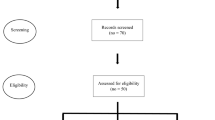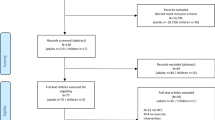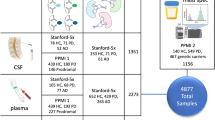Abstract
Pompe disease is a rare, progressive lysosomal storage disorder for which enzyme therapy (ERT) became available in 2006. Four years earlier, the IPA/Erasmus MC survey, an international longitudinal prospective survey, was established to collect information on the natural course of the disease and its burden on patients. The survey is a collaboration between Erasmus MC University Medical Center and the International Pompe Association (IPA) and comprises an annual questionnaire that was specifically designed to assess the symptoms and problems of the disease. Here we review our results of over 10 years of follow-up, and discuss the survey’s contribution to the field. Tracking 408 Pompe patients between 2002 and 2013, the cumulative data reveals the broad range of clinical manifestations that interfere with patients’ lives. The survey allowed us to quantify the rate of disease progression and the positive effects of ERT on patients’ quality of life, fatigue, and participation in daily life. Furthermore, it showed for the first time that survival is reduced in adult Pompe disease and improved by ERT. Our results show that a patient survey can serve as a valuable and reliable tool for obtaining quantifiable information on the natural course of a rare disease and on the effects of therapy in a large cohort over a very long time. Most importantly, by working with patient reported outcomes, the survey provides the data that is truly relevant to the patient and complementary to clinical datasets.




Similar content being viewed by others
Abbreviations
- ERT:
-
Enzyme replacement therapy
- FSS:
-
Fatigue severity scale
- GAA:
-
Acid alpha-glucosidase
- IPA:
-
International Pompe association
- rh-GAA:
-
Recombinant human acid alpha-glucosidase
- RHS:
-
Rotterdam handicap scale
- SF-36:
-
Short-form 36 health survey
References
Amalfitano A, Bengur AR, Morse RP et al (2001) Recombinant human acid alpha-glucosidase enzyme therapy for infantile glycogen storage disease type II: results of a phase I/II clinical trial. Genet Med 3:132–138
Angelini C, Semplicini C, Tonin P et al (2009) Progress in enzyme replacement therapy in glycogen storage disease type II. Ther Adv Neurol Disord 2:143–153
Angelini C, Semplicini C, Ravaglia S et al (2012) Observational clinical study in juvenile-adult glycogenosis type 2 patients undergoing enzyme replacement therapy for up to 4 years. J Neurol 259:952–958
Ausems MG, Verbiest J, Hermans MP et al (1999) Frequency of glycogen storage disease type II in The Netherlands: implications for diagnosis and genetic counselling. Eur J Hum Genet 7:713–716
Chakrapani A, Vellodi A, Robinson P, Jones S, Wraith JE (2010) Treatment of infantile Pompe disease with alglucosidase alpha: the UK experience. J Inherit Metab Dis 33:747–750
de Vries JM, van der Beek NA, Hop WC et al (2012) Effect of enzyme therapy and prognostic factors in 69 adults with Pompe disease: an open-label single-center study. Orphanet J Rare Dis 7:73
Ebbink BJ, Aarsen FK, van Gelder CM et al (2012) Cognitive outcome of patients with classic infantile Pompe disease receiving enzyme therapy. Neurology 78:1512–1518
Engel AG, Seybold ME, Lambert EH, Gomez MR (1970) Acid maltase deficiency: comparison of infantile, childhood, and adult types. Neurology 20:382
Gungor D (2013) Survival, quality of life and effects of enzyme replacement therapy in adults with Pompe disease. Outcomes of the IPA/Erasmus MC Pompe survey. Erasmus University Rotterdam, Rotterdam
Gungor D, de Vries JM, Hop WC et al (2011) Survival and associated factors in 268 adults with Pompe disease prior to treatment with enzyme replacement therapy. Orphanet J Rare Dis 6:34
Gungor D, de Vries JM, Brusse E et al (2013a) Enzyme replacement therapy and fatigue in adults with Pompe disease. Mol Genet Metab doi: 10.1016/j.ymgme.2013.03.016.
Gungor D, Kruijshaar ME, Plug I et al (2013b) Impact of enzyme replacement therapy on survival in adults with Pompe disease: results from a prospective international observational study. Orphanet J Rare Dis 8:49
Gungor D, Schober AK, Kruijshaar ME et al (2013c) Pain in adult patients with Pompe disease: a cross-sectional survey. Mol Genet Metab 109:371–376
Hagemans ML, Janssens AC, Winkel LP et al (2004) Late-onset Pompe disease primarily affects quality of life in physical health domains. Neurology 63:1688–1692
Hagemans ML, Winkel LP, Hop WC, Reuser AJ, Van Doorn PA, Van der Ploeg AT (2005a) Disease severity in children and adults with Pompe disease related to age and disease duration. Neurology 64:2139–2141
Hagemans ML, Winkel LP, Van Doorn PA et al (2005b) Clinical manifestation and natural course of late-onset Pompe’s disease in 54 Dutch patients. Brain 128:671–677
Hagemans ML, Hop WJ, Van Doorn PA, Reuser AJ, Van der Ploeg AT (2006) Course of disability and respiratory function in untreated late-onset Pompe disease. Neurology 66:581–583
Hagemans ML, Laforet P, Hop WJ et al (2007a) Impact of late-onset Pompe disease on participation in daily life activities: evaluation of the Rotterdam handicap scale. Neuromuscul Disord 17:537–543
Hagemans ML, van Schie SP, Janssens AC, van Doorn PA, Reuser AJ, van der Ploeg AT (2007b) Fatigue: an important feature of late-onset Pompe disease. J Neurol 254:941–945
Hirschhorn R, Reuser AJ (2001) Glycogen storage disease type II: acid alphaglucosidase (acid maltase) deficiency. In: Scriver CR, Beaudet AL, Sly WS, Valle D (eds) The metabolic and molecular bases of inherited disease, 8th edn. McGraw-Hill, New York, pp 3389–3420
International classification of functioning, disability and health. (2001) World Health Organisation
Kanters TA, Hagemans ML, van der Beek NA, Rutten FF, van der Ploeg AT, Hakkaart L (2011) Burden of illness of Pompe disease in patients only receiving supportive care. J Inherit Metab Dis 34:1045–1052
Kishnani PS, Hwu WL, Mandel H et al (2006) A retrospective, multinational, multicenter study on the natural history of infantile-onset Pompe disease. J Pediatr 148:671–676
Kishnani PS, Corzo D, Nicolino M et al (2007) Recombinant human acid [alpha]-glucosidase: major clinical benefits in infantile-onset Pompe disease. Neurology 68:99–109
Krupp LB, LaRocca NG, Muir-Nash J, Steinberg AD (1989) The fatigue severity scale. Application to patients with multiple sclerosis and systemic lupus erythematosus. Arch Neurol 46:1121–1123
Lachmann R, Schoser B (2013) The clinical relevance of outcomes used in late-onset Pompe disease: can we do better? Orphanet J Rare Dis 8:160
Laforet P, Nicolino M, Eymard PB et al (2000) Juvenile and adult-onset acid maltase deficiency in France: genotype-phenotype correlation. Neurology 55:1122–1128
Martiniuk F, Chen A, Mack A et al (1998) Carrier frequency for glycogen storage disease type II in New York and estimates of affected individuals born with the disease. Am J Med Genet 79:69–72
Merkies IS, Schmitz PI, Samijn JP, van der Meche FG, van Doorn PA (1999) Fatigue in immune-mediated polyneuropathies. European Inflammatory Neuropathy Cause and Treatment (INCAT) Group. Neurology 53:1648–1654
Merkies IS, Schmitz PI, Van Der Meche FG, Samijn JP, Van Doorn PA (2002) Psychometric evaluation of a new handicap scale in immune-mediated polyneuropathies. Muscle Nerve 25:370–377
Muller-Felber W, Horvath R, Gempel K et al (2007) Late onset Pompe disease: clinical and neurophysiological spectrum of 38 patients including long-term follow-up in 18 patients. Neuromuscul Disord 17:698–706
Orlikowski D, Pellegrini N, Prigent H et al (2011) Recombinant human acid alpha-glucosidase (rhGAA) in adult patients with severe respiratory failure due to Pompe disease. Neuromuscul Disord 21:477–482
Pompe JC (1932) Over idiopathische hypertrofie van het hart. Ned Tijdschr Geneeskd 76:304–311
Regnery C, Kornblum C, Hanisch F et al (2012) 36 months observational clinical study of 38 adult Pompe disease patients under alglucosidase alfa enzyme replacement therapy. J Inherit Metab Dis 35:837–845
Resnik L, Plow MA (2009) Measuring participation as defined by the international classification of functioning, disability and health: an evaluation of existing measures. Arch Phys Med Rehabil 90:856–866
Rigter T, Weinreich SS, van El CG et al (2012) Severely impaired health status at diagnosis of Pompe disease: a cross-sectional analysis to explore the potential utility of neonatal screening. Mol Genet Metab 107:448–455
Slonim AE, Bulone L, Ritz S, Goldberg T, Chen A, Martiniuk F (2000) Identification of two subtypes of infantile acid maltase deficiency. J Pediatr 137:283–285
Strothotte S, Strigl-Pill N, Grunert B et al (2010) Enzyme replacement therapy with alglucosidase alfa in 44 patients with late-onset glycogen storage disease type 2: 12-month results of an observational clinical trial. J Neurol 257:91–97
Tarlov AR, Ware JE Jr, Greenfield S, Nelson EC, Perrin E, Zubkoff M (1989) The Medical Outcomes Study. An application of methods for monitoring the results of medical care. JAMA 262(7):925-30
Toscano A, Schoser B (2013) Enzyme replacement therapy in late-onset Pompe disease: a systematic literature review. J Neurol 260:951–959
van Capelle CI, Winkel LP, Hagemans ML et al (2008) Eight years experience with enzyme replacement therapy in two children and one adult with Pompe disease. Neuromuscul Disord 18:447–452
Van den Hout H, Reuser AJ, Vulto AG, Loonen MC, Cromme-Dijkhuis A, Van der Ploeg AT (2000) Recombinant human alpha-glucosidase from rabbit milk in Pompe patients. Lancet 356:397–398
van den Hout JM, Reuser AJ, de Klerk JB, Arts WF, Smeitink JA, Van der Ploeg AT (2001) Enzyme therapy for pompe disease with recombinant human alpha-glucosidase from rabbit milk. J Inherit Metab Dis 24:266–274
Van den Hout JM, Hop W, van Diggelen OP et al (2003) The natural course of infantile Pompe’s disease: 20 original cases compared with 133 cases from the literature. Pediatrics 112:332–340
van der Beek NA, van Capelle CI, van der Velden-van Etten KI et al (2011) Rate of progression and predictive factors for pulmonary outcome in children and adults with Pompe disease. Mol Genet Metab 104:129–136
van der Beek NA, de Vries JM, Hagemans ML et al (2012) Clinical features and predictors for disease natural progression in adults with Pompe disease: a nationwide prospective observational study. Orphanet J Rare Dis 7:88
van der Beek NA, Hagemans ML, van der Ploeg AT, van Doorn PA, Merkies IS (2013) The Rasch-built Pompe-specific activity (R-PAct) scale. Neuromuscul Disord 23:256–264
van der Ploeg AT, Reuser AJ (2008) Pompe’s disease. Lancet 372:1342–1353
van der Ploeg AT, Clemens PR, Corzo D et al (2010) A randomized study of alglucosidase alfa in late-onset Pompe’s disease. N Engl J Med 362:1396–1406
van Gelder CM, van Capelle CI, Ebbink BJ et al (2012) Facial-muscle weakness, speech disorders and dysphagia are common in patients with classic infantile Pompe disease treated with enzyme therapy. J Inherit Metab Dis 35:505–511
Vielhaber S, Brejova A, Debska-Vielhaber G et al (2011) 24-months results in two adults with Pompe disease on enzyme replacement therapy. Clin Neurol Neurosurg 113:350–357
Winkel LP, Hagemans ML, van Doorn PA et al (2005) The natural course of non-classic Pompe’s disease; a review of 225 published cases. J Neurol 252:875–884
Wokke JH, Escolar DM, Pestronk A et al (2008) Clinical features of late-onset Pompe disease: a prospective cohort study. Muscle Nerve 38:1236–1245
Acknowledgements
The IPA/Erasmus MC Pompe survey was a joint initiative of the International Pompe Association (IPA) and Erasmus MC University Medical Center. We thank all patients for participating in the survey, and Marylyn House, Thomas Schaller, Guy Ashford-Smith, Raymond Saich, Marsha Zimmerman, and Rineke Nelisse for their contribution to the organizational part of the study. We thank David Alexander for his critical reading of the manuscript and Arnold Reuser for his continuous support concerning all his activities regarding Pompe disease and particular his contribution to the study.
Compliance with Ethics Guidelines
ᅟ
Competing interests
Research on Pompe disease at Erasmus MC is financially supported by ZonMw- the Netherlands Organization for Health Research and Development [project no. 152001005]; the Dutch TI Pharma initiative “Sustainable Orphan Drug Development through Registries and Monitoring (T6-208); “EUCLYD-a European Consortium for Lysosomal Storage Diseases” (health F2/2008 grant agreement 201678); and the Prinses Beatrix Fonds [project no. OP07-08]; MEUSIX [FP7/2007-2013, grant agreement n 304999]; SSWO; Colciencias and Genzyme Corp. AvdP has provided consultancy services for various industries. The other authors declare that they have no conflict of interest.
Informed Consent
All procedures followed were in accordance with the ethical standards of the responsible committee on human experimentation (institutional and national) and with the Helsinki Declaration of 1975, as revised in 2000. Informed consent for inclusion in the study was obtained from all patients or their parents.
Author information
Authors and Affiliations
Corresponding author
Additional information
Communicated by: Olaf Bodamer
Rights and permissions
About this article
Cite this article
van der Meijden, J.C., Güngör, D., Kruijshaar, M.E. et al. Ten years of the international Pompe survey: patient reported outcomes as a reliable tool for studying treated and untreated children and adults with non-classic Pompe disease. J Inherit Metab Dis 38, 495–503 (2015). https://doi.org/10.1007/s10545-014-9751-2
Received:
Revised:
Accepted:
Published:
Issue Date:
DOI: https://doi.org/10.1007/s10545-014-9751-2




